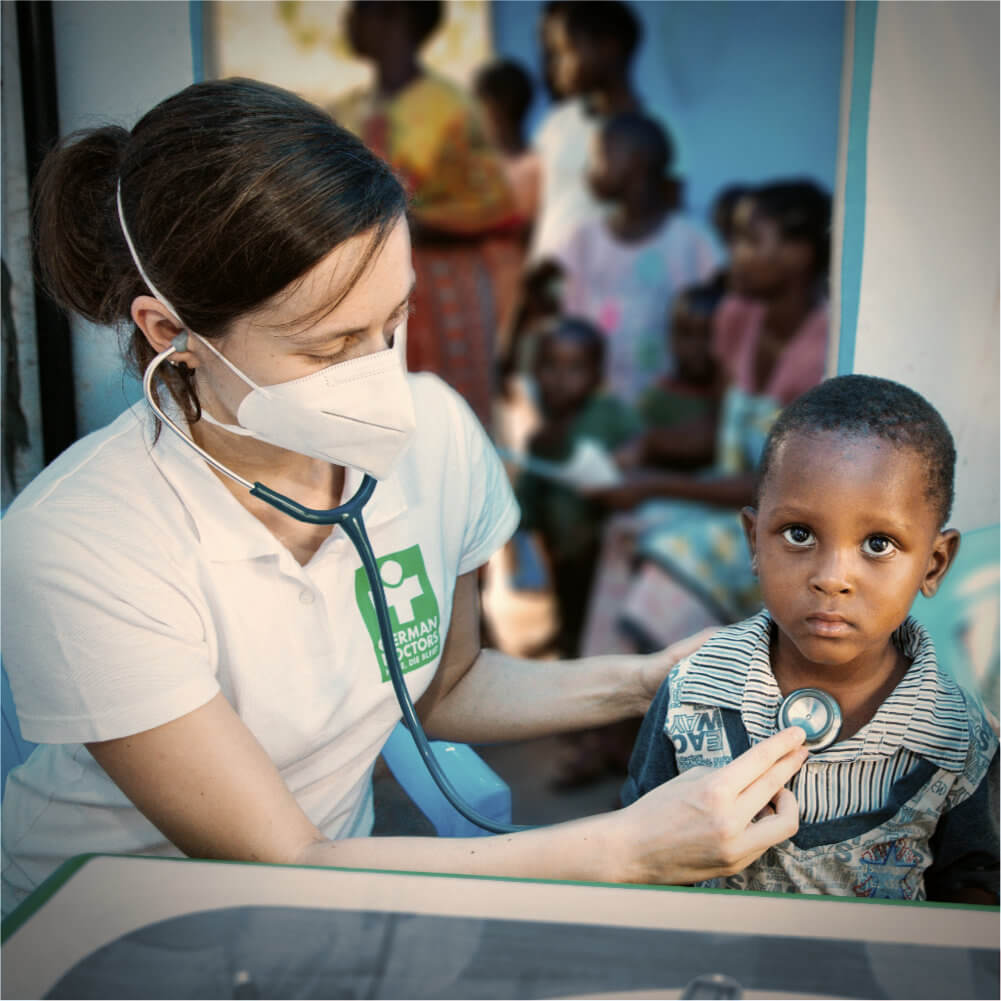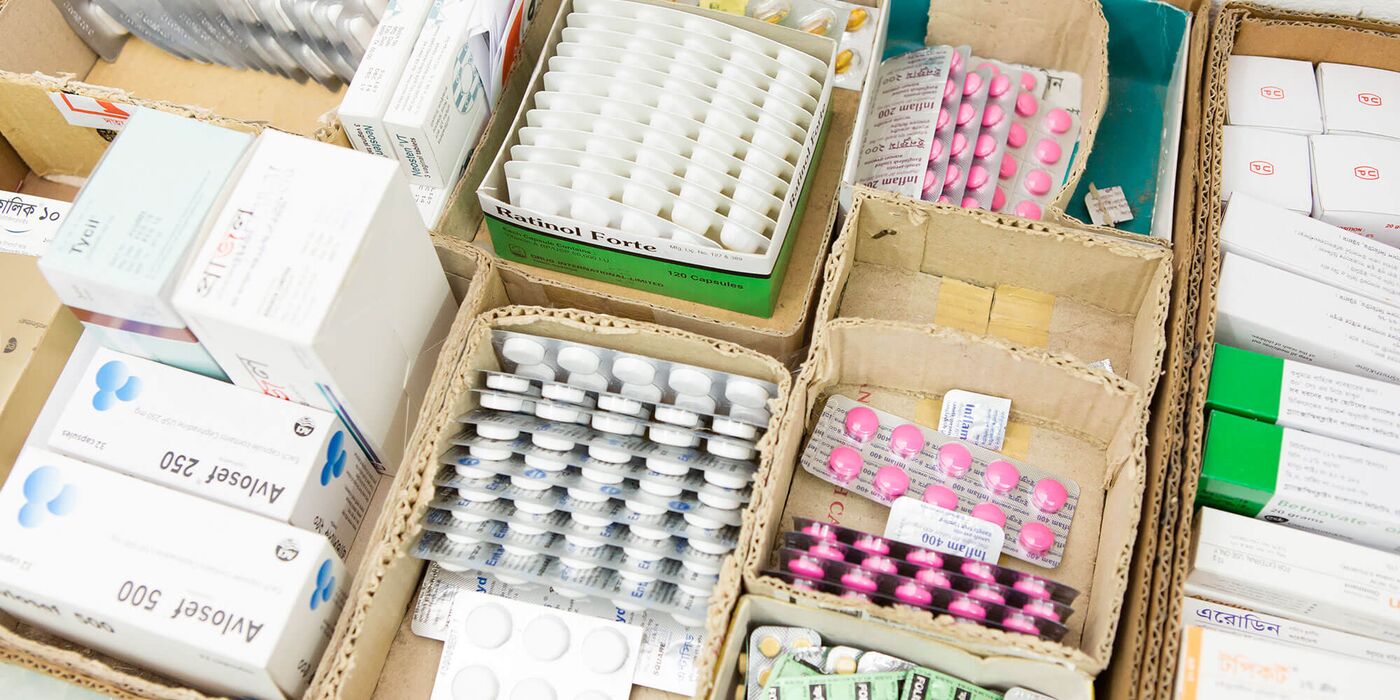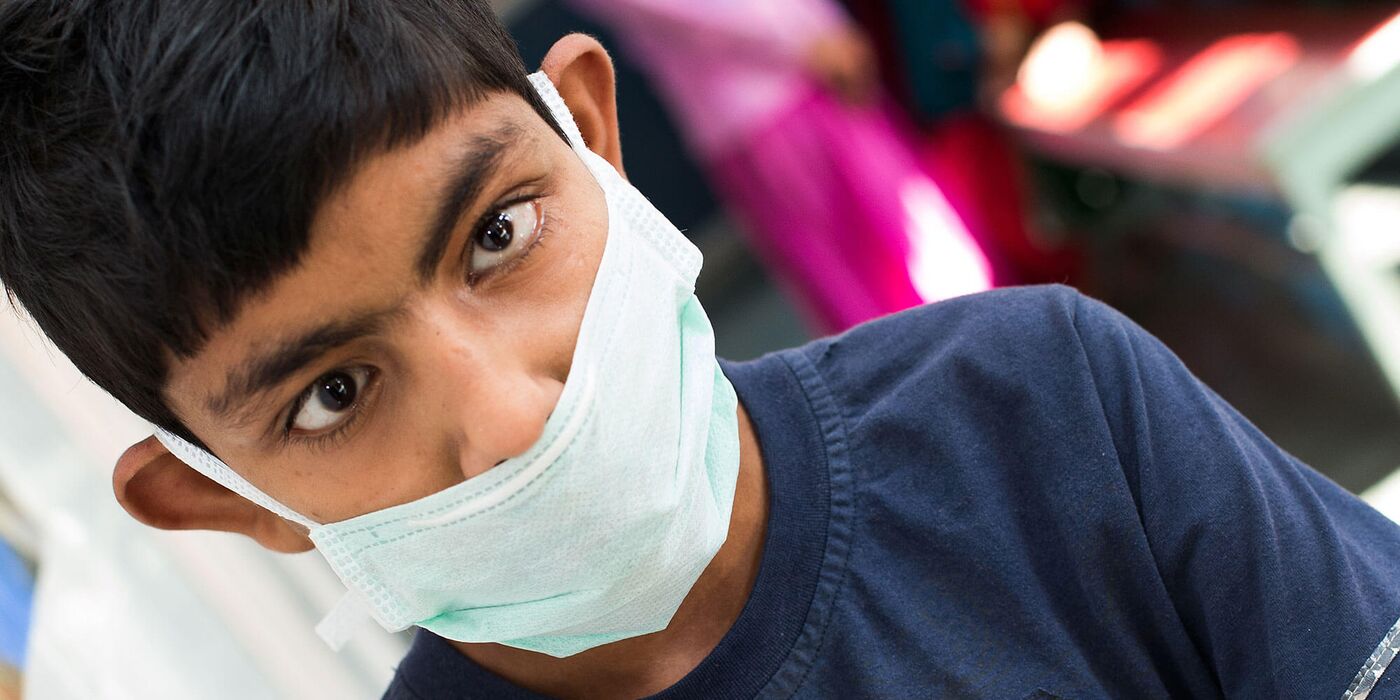

- Doctors for people in need
- |
- Discover projects
- |
- Refugee relief
- |
- Help for underage refugees in Greece
- |


- Doctors for people in need
- |
- Discover projects
- |
- Refugee relief
- |
- Help for underage refugees in Greece
- |
Our project in Greece
Survey
Hand in hand with local partners
The team consisting of two German Doctors and a salaried local doctor holds regular consultations in the different facilities run by ARSIS in northern Greece to reach as many needy individuals as possible. ARSIS maintains a number of projects for refugees there, including social services and accommodations for unaccompanied minors. We profit from our partner’s permanent structures and complement the project with medical components. As in most of our projects, our goal here is to sustainably improve the local medical care.
Medical aid speeds up integration
We support the efforts of many refugees to integrate by providing access to better healthcare services. According to Greek law, unaccompanied minors in refugee camps or protective custody cannot be transferred to appropriate accommodations without having passed a basic medical examination. This is to ensure that infections do not spread among the refugees. In the refugee camps, most of which are completely overfilled, there is often only one doctor available who cannot treat everyone and who doesn’t cover all specialities. Access to the national healthcare system is only possible when the refugees have left the provisional camp. The national hospitals are also overburdened. The result is that diseases are often incorrectly treated or not treated at all, even relatively harmless infections.





Education and emergency aid
In addition to our medical aid, we regularly clarify which services refugees are allowed to use. We provide information about protective and preventive measures against diseases and infections, as well as sexual health. Knowledge about protection and health education are especially important during the covide-19 pandemic. Homeless adults and children often do not have even the bare necessities, like warm clothing, food, and hygiene articles. Whenever needed, we also distribute items of everyday need.
Hand in hand with local partners
The team consisting of two German Doctors and a salaried local doctor holds regular consultations in the different facilities run by ARSIS in northern Greece to reach as many needy individuals as possible. ARSIS maintains a number of projects for refugees there, including social services and accommodations for unaccompanied minors. We profit from our partner’s permanent structures and complement the project with medical components. As in most of our projects, our goal here is to sustainably improve the local medical care.
Medical aid speeds up integration
We support the efforts of many refugees to integrate by providing access to better healthcare services. According to Greek law, unaccompanied minors in refugee camps or protective custody cannot be transferred to appropriate accommodations without having passed a basic medical examination. This is to ensure that infections do not spread among the refugees. In the refugee camps, most of which are completely overfilled, there is often only one doctor available who cannot treat everyone and who doesn’t cover all specialities. Access to the national healthcare system is only possible when the refugees have left the provisional camp. The national hospitals are also overburdened. The result is that diseases are often incorrectly treated or not treated at all, even relatively harmless infections.
Education and emergency aid
In addition to our medical aid, we regularly clarify which services refugees are allowed to use. We provide information about protective and preventive measures against diseases and infections, as well as sexual health. Knowledge about protection and health education are especially important during the covide-19 pandemic. Homeless adults and children often do not have even the bare necessities, like warm clothing, food, and hygiene articles. Whenever needed, we also distribute items of everyday need.
Dates & Facts
Project start: February 2021
Present number of Doctors: 2
Missions: 35 volunteer physician outreaches since project inception.
Patient contacts: Approximately 6500 treatments were provided in 2022.
Partner: ARSIS (Association for the Social Support of Youth).This Greek NGO with headquarters in Thessaloniki works in northern Greece, in Thessaloniki and surroundings, e.g., Volos, Evros, and Ioannina. ARSIS maintains numerous projects in connection with refugees, paying special attention to unaccompanied, underage refugees. The organization offers shelters (children’s homes), safe zones in the reception centers, etc.
Structure: The German Doctors hold consultations at different locations in a steady rhythm of about every one to two weeks. They are assisted by a salaried Greek physician. Medical aid is complemented with information and education about health, hygiene, and safety.




Operational areas: various regions in northern Greece
Focal points: Improvement of refugees’ health conditions (with an emphasis on unaccompanied minors and children) through basic medical care, health education, and protection.
Psychotherapeutic aid for unaccompanied underage refugees: The German Doctors have conducted a psychotherapeutic project in cooperation with ARSIS since August 2016. The project is financed by funds from the Alliance for Development Aid (BEH), an association of organizations, of which the German Doctors is an associate member.
Project start: February 2021
Present number of Doctors: 2
Missions: 35 volunteer physician outreaches since project inception.
Patient contacts: Approximately 6500 treatments were provided in 2022.
Partner: ARSIS (Association for the Social Support of Youth).This Greek NGO with headquarters in Thessaloniki works in northern Greece, in Thessaloniki and surroundings, e.g., Volos, Evros, and Ioannina. ARSIS maintains numerous projects in connection with refugees, paying special attention to unaccompanied, underage refugees. The organization offers shelters (children’s homes), safe zones in the reception centers, etc.
Structure: The German Doctors hold consultations at different locations in a steady rhythm of about every one to two weeks. They are assisted by a salaried Greek physician. Medical aid is complemented with information and education about health, hygiene, and safety.
Operational areas: various regions in northern Greece
Focal points: Improvement of refugees’ health conditions (with an emphasis on unaccompanied minors and children) through basic medical care, health education, and protection.
Psychotherapeutic aid for unaccompanied underage refugees: The German Doctors have conducted a psychotherapeutic project in cooperation with ARSIS since August 2016. The project is financed by funds from the Alliance for Development Aid (BEH), an association of organizations, of which the German Doctors is an associate member.
Psychotherapeutic Aid
Underage, unaccompanied, and traumatized
Dr. Elizabeth Kauder, President of our organization, and her colleague, Eva Feine-Enninger, both psychotherapists, established a completely new project for underage unaccompanied refugees in Greece together with ARSIS at the end of 2016. The goal was to help the young people deal with their traumatic experiences through psychotherapy. The therapeutic sessions for the young people who had fled their native countries alone were carried out in Sindos, Volos, Ioannina, and other sites. The team trained 80 social workers and social pedagogues from our project partner, ARSIS, in the method “Sand Game in the Group”. The training consisted of a theoretical and a self-awareness part. Workshops and supervision took place at regular intervals on site, as well as an exchange of experiences with all participants on skype.




Using the sand game to counteract the trauma of flight
No words are needed in the so-called method “Sand Game in the Group”, which was used for therapy of the traumatized youths. Since it is a non-verbal method, it is highly suitable for work with young people from Syria, Afghanistan, and other countries. The young people shape their experiences and emotions using figures and materials in a box filled with sand. They are given these boxes along with a number of materials ranging from marbles, feathers, and colored stones to miniature buildings, to war vehicles, human and animal figures, trees and other plants. We often observed that the game initiated a very productive process among the young people, which was demonstrated in the sand pictures and also in their behavior.
Sustainable aid
It was our declared goal from the very beginning of the project to train dedicated ARSIS colleagues so that they could competently and independently accompany the traumatized youths during the sand games. The concept “train the trainers” was also successful. During the final training sessions in the fall of 2018 and February 2019, the German Doctors remained in the background, as the ARSIS colleagues were able to independently transfer their learned competencies within the organization. A total of 80 colleagues were trained during the term of the project.
Underage, unaccompanied, and traumatized
Dr. Elizabeth Kauder, President of our organization, and her colleague, Eva Feine-Enninger, both psychotherapists, established a completely new project for underage unaccompanied refugees in Greece together with ARSIS at the end of 2016. The goal was to help the young people deal with their traumatic experiences through psychotherapy. The therapeutic sessions for the young people who had fled their native countries alone were carried out in Sindos, Volos, Ioannina, and other sites. The team trained 80 social workers and social pedagogues from our project partner, ARSIS, in the method “Sand Game in the Group”. The training consisted of a theoretical and a self-awareness part. Workshops and supervision took place at regular intervals on site, as well as an exchange of experiences with all participants on skype.
Using the sand game to counteract the trauma of flight
No words are needed in the so-called method “Sand Game in the Group”, which was used for therapy of the traumatized youths. Since it is a non-verbal method, it is highly suitable for work with young people from Syria, Afghanistan, and other countries. The young people shape their experiences and emotions using figures and materials in a box filled with sand. They are given these boxes along with a number of materials ranging from marbles, feathers, and colored stones to miniature buildings, to war vehicles, human and animal figures, trees and other plants. We often observed that the game initiated a very productive process among the young people, which was demonstrated in the sand pictures and also in their behavior.
Sustainable aid
It was our declared goal from the very beginning of the project to train dedicated ARSIS colleagues so that they could competently and independently accompany the traumatized youths during the sand games. The concept “train the trainers” was also successful. During the final training sessions in the fall of 2018 and February 2019, the German Doctors remained in the background, as the ARSIS colleagues were able to independently transfer their learned competencies within the organization. A total of 80 colleagues were trained during the term of the project.
Living Conditions
Alarming situation in the Greek refugee camps
The current living conditions for people with international protection status in Greece are alarming. The men, women, and children who have to hold out in the tent camps on the Greek islands often have no adequate access to food, water, and hygiene facilities. The are more or less exposed to the weather without protection. Add to that the agonizing uncertainty about their future, as important information concerning asylum procedures is often not available. The anxiety about possible deportation to an unsafe home country is an enormous burden. According to recent (January 2020) estimations, almost 115,600 refugees live in Greece, around 41,200 of whom are stranded on islands. The Greek asylum system is severely overburdened.



Underage refugees – alone and traumatized
Many of the young people our partner organization, ARSIS, looks after come from Syria. They were sent away by their families to save them from serving in Assad’s army or the IS. At the same time, the families in Syria have high expectations of the successful arrival of the young people in Europe. They carry a terrific burden on their young shoulders, which they must carry alone. Many of the youths whom we treat struggle with the traumatic experiences, which they were exposed to during the war and their flight. Others are quartered under prison-like conditions in the so-called “safe zones”. Many are homeless.
The corona pandemic intensifies the unacceptable situation
These already extremely difficult living conditions have been intensified by the corona pandemic. It is often impossible to maintain the specified distance in the overfilled camps. Access to clean water, hygiene products, and health care is also severely limited. Several whole camps have been temporarily placed under quarantine to fulfil the enacted preventive measures
Alarming situation in the Greek refugee camps
The current living conditions for people with international protection status in Greece are alarming. The men, women, and children who have to hold out in the tent camps on the Greek islands often have no adequate access to food, water, and hygiene facilities. The are more or less exposed to the weather without protection. Add to that the agonizing uncertainty about their future, as important information concerning asylum procedures is often not available. The anxiety about possible deportation to an unsafe home country is an enormous burden. According to recent (January 2020) estimations, almost 115,600 refugees live in Greece, around 41,200 of whom are stranded on islands. The Greek asylum system is severely overburdened.
Underage refugees – alone and traumatized
Many of the young people our partner organization, ARSIS, looks after come from Syria. They were sent away by their families to save them from serving in Assad’s army or the IS. At the same time, the families in Syria have high expectations of the successful arrival of the young people in Europe. They carry a terrific burden on their young shoulders, which they must carry alone. Many of the youths whom we treat struggle with the traumatic experiences, which they were exposed to during the war and their flight. Others are quartered under prison-like conditions in the so-called “safe zones”. Many are homeless.
The corona pandemic intensifies the unacceptable situation
These already extremely difficult living conditions have been intensified by the corona pandemic. It is often impossible to maintain the specified distance in the overfilled camps. Access to clean water, hygiene products, and health care is also severely limited. Several whole camps have been temporarily placed under quarantine to fulfil the enacted preventive measures













